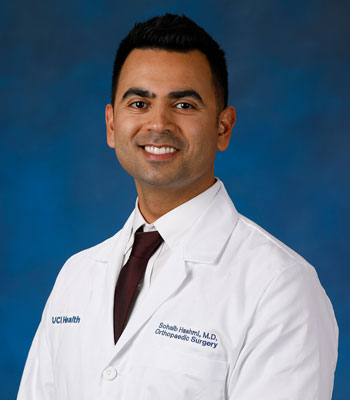
Comprehensive Spine Care
When your back aches, it’s impossible to focus on anything else. Our world-class spine specialists can upgrade your quality of life.
Our experts offer traditional, minimally invasive and delicate surgeries to correct even unusual spine conditions.

Restore movement and enjoyment of life with leading-edge spine care
We handle any condition, from pinched nerves to rare and complex spinal procedures.
Call 714-456-3300 to speak with one of our spine care specialists or click below to schedule an appointment online.
Our approach to comprehensive spine care
At UCI Health, we keep you at the center of our expertise, not just your illness.
We approach your medical care with empathy, deep listening and solid, state-of-the-art science. When recommending treatments, we also take your concerns and preferences into account.
Our spine center
When you come to a registered comprehensive spine center, you will be receiving expert care from multiple specialties. These specialists confer regularly, often weekly, to present you with the best possible treatment options.
The doctors in our Comprehensive Spine Center include:
- Interventional neuroradiologists (guide spine surgery with sophisticated imaging devices)
- Neurosurgeons
- Orthopaedic surgeons
- Physiatrists (to help you regain full functioning)
- Spine surgeons
The team keeps in close contact at each step, from your diagnosis to surgery to after-care.
Why choose UCI Health for comprehensive spine care?
Pioneering spine surgery
UCI Health spine specialists performed the first West Coast robot-assisted spinal surgery. We can perform any spine surgery, no matter how complex, with SpineAssist®.
This highly sophisticated robotic guidance and imaging system helps us customize a plan we tailor to your anatomy.
We can plot where to make incisions and place screw implants to within one millimeter as we stabilize your spine. This significantly lowers the rates of misplaced screws and neurological problems later.
This groundbreaking, minimally invasive procedure offers you:
- less pain
- less radiation
- faster recovery
- faster surgery with greater accuracy that needs fewer X-ray images
We offer ultra minimally invasive surgeries
UCI Health is one of few hospitals in the nation to offer endoscopic spine surgery, an ultra-minimally invasive approach to spine care.
This technique can have many benefits such as:
- minimized incision size
- faster recovery time
- discharge 24 hours of their procedure
- less postoperative pain
- decreased infection rates
- reduced blood loss
- preservation of spinal stability
Second opinion consultations
No one should get spine surgery without getting a second opinion. Our Comprehensive Spine Center also offers a special research study that evaluates the role second opinions play when deciding to get spine surgery.
You can potentially get a high-level second opinion from an experienced surgeon before selecting your treatment. There is no cost to you.
To qualify, you:
- must have received a first opinion from another spine surgeon
- are willing to complete surveys on the effects of the second opinion you receive
To enroll in the second opinion research study, call our spine nurse coordinator at 657-601-2656.
World-class expertise
International colleagues routinely select our spine specialists to teach the state-of-the-art treatments we’ve developed.
We also share our research and knowledge in books and industry publications.
Academic medical center
As Orange County's only academic medical center, our doctors are leaders in research and innovation. They apply the latest findings directly to your care, ensuring you receive the most advanced treatments available.
Looking for more options?
View all clinicians
Find an orthopaedics clinical trial
Talk to your doctor to see if a orthopaedics clinical trial is right for you.
Featured News Stories

Benefits and challenges of outpatient spine surgery setting

Future of spine surgery is bright
Choosing an adjustable bed
Featured Blog Posts

Runner recovers swiftly after fusionless endoscopic spine surgery

Outpatient spine surgery gets runner back on track

A 'dream come true' realized in Irvine
Dr. Michael J. Stamos once envisioned opening a small cancer center on the UC Irvine campus. What has emerged, he says, is so much more.




